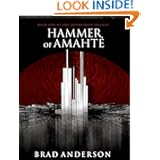I was tagged by a fellow writer, Brad Anderson,
to participate in The Next Big Thing Blog Hop. Brad is currently
working on a science fiction space opera, the third book in a series called the Triumvirate Trilogy. The setting is near the tail end of a devastating war between the three major powers of this universe. Definitely seems intriguing and I'll be checking it out.
Here’s how the blog hop works. A writer/blogger gets tagged, they write
an intro where they shout out & link back to their tagger, and then
answer the 10 questions listed below about current work in progress. At
the end, they tag five other writer/bloggers.
10 Questions About My Current Work in Progress:
1. What is the title of your book?
I’m at the very start of The Troubleshooter: The Most Dangerous Dame. It is the second full length novel in a continuing series about a hardboiled private eye character in a dystopian future world.2. Where did the idea come from for the book?
I've always liked the film noir style, with all of the jargon and colorful characters included. The idea rolled around in my head as I read novels like Walter Mosley's Easy Rawlins series and watched films like Dark City, The Matrix, and of course the biggest film influence: Blade Runner.The idea was to take both of those unrelated genres and combine them. A blend of old and new, noir and sci-fi with a dystopian twist. So you get your slick hustlers, cool dames, fedoras and trench coats along with your flying cars, synthetic humanoids, and post-apocalyptic futures. The reader is taken along for a ride with Mick Trubble: a hard drinking, chain smoking, slick talking man whose job description is shooting trouble. In the installment that I'm working on, Mick is recovering from revelations from the last book, only to find himself engaged in a deadly game with a person who comes from his murky past. It's going to be a blast, and I can't to get deeper into it.
 |
| The debut novel |
3. What genre does your book fall under?
It's hard to fit it to one particular genre, since it blends elements of noir, detective, sci-fi, dystopia and dieselpunk. But I like to call it 'dystopian noir' for short.4. Which actors would you choose to play your characters in a movie rendition?
 |
| Uma Thurman as Selene |
 |
| Shahid Kapoor as Poddar |
 |
| Ethan Hawke as Frankie Newman |
5. What is the one-sentence synopsis of your book?
30's noir meets science fiction in this dystopian tale of a man whose job description is shooting trouble..6. Will your book be self-published or represented by an agency?
Self-published7. How long did it take you to write your first draft?
I'm just starting the first draft of Most Dangerous Dame, but New Haven Blues took me around three months for that very rough first draft. When you add in the time to almost completely re-write it, you're looking at about five months, give or take a week or so.8. What other books would you compare yours to within your genre?
I haven't read the Harry Dresden novels yet, but from what I've read of the series, it has a similar 'urban noir' style, only those are of a supernatural angle. There's also the E.M. Faustus novels by Christoper Davison which I recently came upon, which is also a noir blended series. I'm sure there are more out there, but I haven't run across them yet.9. Who or what inspired you to write this book?
The novel started off as just a writing exercise to try out stream of consciousness storytelling. I just took things I liked from similar themed movies and novels and ran with it. Once it was finished, I knew immediately that it had potential for a full-length novel. From there it all about shaping it and expanding the ideas and characters.10. What else about the book might pique the reader’s interest?
It's a fast paced story laced with colorful characters, dry wit, and plenty of action. What I've liked from the readers is that it's been praised by readers of old school pulp and noir as well as readers of science fiction, detective, and adventure lovers. There's also a lot of humor that readers have enjoyed. Mick Trubble gets himself in some pretty ridiculous situations at times.All Right, Who’s Next in the Next Big Thing Blog Hop?
Victoria Selene Skye Deme is a highly talented writer and friend. Known mainly for her volumes of captivatingly surreal poetic collections, but she has a groundbreaking prose project in the works as well. In fact, she so fantastic that a major character in The Troubleshooter is named and styled after her. How cool is that?David W Moore is a friend and writing peer that I've come to know across various online sites. He has horror novel being circulated to publishing houses at the moment, as well as a sequel in the works. Definitely someone to keep an eye on.
Christopher Davison is the author of a hardboiled detective series not unlike my own, although his comes with a paranormal twist. If his interview answers are as wild as his writing then we should be in for a wild ride!
I recently met C.L. Davies, who writes in the genre of science fiction and dystopia. Her debut novel was Automaton, any eye-opening take on the gaming and online relationship culture. I look forward to hearing about her other projects, as well as what's forthcoming.
Tiyana White is a writer I came across while doing a reviewer search. Her upcoming project is called Element 7, a dieselpunk fantasy novel with a very intriguing premise. I personally can't wait to hear more about it.










